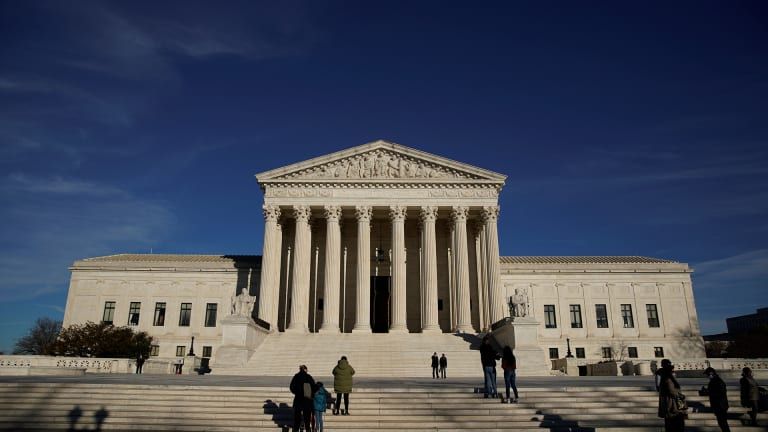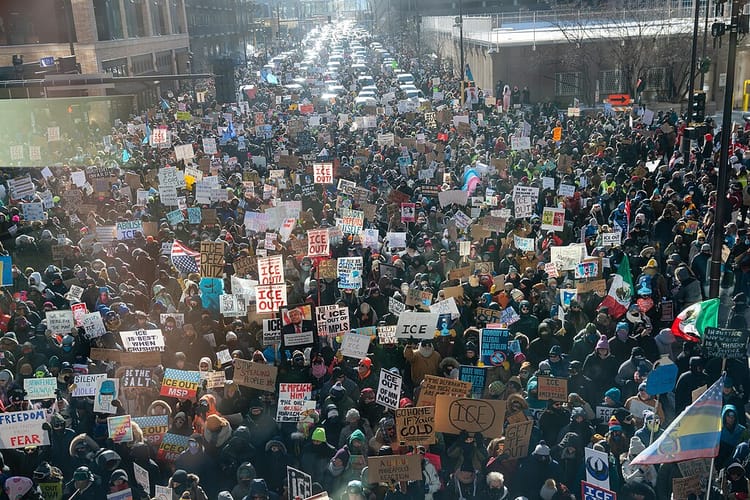The Real Reason Big Oil Wants Climate Cases at the Supreme Court

For more than five years now, fossil fuel companies have been arguing that the more than two dozen climate liability cases filed against them by counties, cities and states across the country belong in federal court as opposed to state court where they were filed. This seems like a minor administrative detail, I know. But it's part of a bigger strategy, one that goes beyond the obvious point that they think they have a better shot of winning in federal court (in part because they've done it before, in the famed American Electric Power v Connecticut case back in 2011). Yes, there's that precedent and yes, the Supreme Court is stacked with right-wing judges guaranteed to be friendly to the industry, and yes Amy Coney-Barrett's dad working for Shell forever is a particularly obvious conflict of interest here. But in a filing this week, the fossil fuel defendants showed their real hand. It's not about jurisdiction at all, it's about free speech. (And yes, I have been yammering about this for years now, probably won't stop any time soon.)
Here's the deal: In 2018, the City of Boulder and the Boards of County Commissioners of Boulder and San Miguel Counties filed suit against ExxonMobil and Suncor Energy Inc. It was the first, and still only, climate liability case to focus on fire and drought rather than sea level rise and storm surge, and since it was filed, Boulder was the scene of some of the most terrifying fires the country has ever seen. In their complaint, the local governments argued that the fossil fuel company defendants “knowingly and substantially contributed to the climate crisis by producing, promoting and selling a substantial portion of the fossil fuels that are causing and exacerbating climate change, while concealing and misrepresenting the dangers associated with their intended use.” They asked the court for compensation for their past and future damages and for costs to mitigate climate change’s impacts and also sought remediation or abatement of the hazards by “practical means,” although they expressly did not demand the immediate shutdown of oil and gas operations (none of these suits have). The fossil fuel companies sought to have the case moved to federal court, the 10th circuit said nope it belongs in state court and last year the companies petitioned the Supreme Court to take up the case. Rather than decide whether or not to take up the case, the court asked the U.S. Department of Justice to weigh in with its opinion. The DOJ complied last month, backing the circuit courts (all of which have moved to keep the cases in state court), and discouraging the Supreme Court from interfering. Which of course doesn't necessarily mean SCOTUS will comply, let's not forget who we're dealing with here. It would be unprecedented for the Supreme Court to ask for the DOJ's opinion and then do the opposite, but this court is nothing if not unprecedented.
We don't yet know whether the Supreme Court justices will decide to take this case up or not, but the brief Exxon and Suncor filed this week in response to the DOJ removes any doubt as to why it's so important to get this case (or, really, any one of these cases) to the Supreme Court. Folks, they're looking for the next Citizens United.
No surprise, they start out by referencing the ruling in West Virginia v EPA, a decision 100% bought and paid for by the industry, from the coordination of it by Scott Pruitt—both when he put the case together as head of the Republican Attorneys General Association (RAGA) and when he kept it alive as head of Trump's EPA—to the bizarre and unprecedented (there's that word again) move the court took to rule on it, despite the fact that the case hinged on a federal policy that was never implemented. "Just two years ago, the United States told this Court that claims seeking redress for injuries allegedly caused by the effect of interstate greenhouse-gas emissions on the global climate are 'inherently federal in nature,' even when labeled as arising under state law," the brief begins. It goes on to accuse the Biden Administration of "virtue signaling" and "flip flopping," and insists: "It is preposterous to suggest that the fate of these cases—with their potentially enormous consequences for an entire sector of the global economy—should be left to handpicked state courts without a deci-sion by this Court sanctioning that outcome."
Better that they be left to a handpicked Supreme Court, certainly. The oil companies' lawyers also lean heavily on the decision of the one circuit that agreed with them about federal jurisdiction: the 2nd Circuit, which ruled in their favor in the case New York filed against them over financial fraud. But that case was distinctly different from the rest, focused on a very narrow accounting issue (in broad strokes, whether they had been accounting for the impacts of climate on their business internally, but not externally), not really about climate liability in any way that would make it applicable to this jurisdictional debate.
So, why are the fossil fuel companies so desperate to see these cases in front of the Supreme Court? A few reasons: first, they have successfully argued before that the Clean Air Act preempts any sort of state action on greenhouse gas emissions. Second, they believe they have a better shot at this pro-industry bench siding with them than any of the more left-leaning state court judges. Third, they'd like to put an end to the barrage of lawsuits they've been facing over the past five years. But fourth, and this is where I've seen almost no one connect the dots: they want to further expand corporate free speech. In almost all of the climate liability cases, the fossil fuel plaintiffs, once they get past arguing jurisdiction, are making a free speech argument that goes roughly: anything we've ever said about climate change was said with the intention of influencing policy; that makes it political speech (or in legalese "petitioning speech"), which is protected by the First Amendment.
To date, the Supreme Court has consistently drawn the line at lying being protected speech, but again, this is an unprecdented court. And it's worth noting that the fossil fuel industry has been leading the charge on corporate free speech since forever. Back in the late 1960s Mobil executives went on a PR blitz telling anyone who would listen how important it was to protect corporate free speech; Mobil went on to help support the precursor to Citizens United, a case called First Bank of Boston v Bellotti, which lifted any limits on corporations paying to advertise their position on policy. In the years since the Citizens United ruling, oil companies have regularly filed amicus briefs in cases that ostensibly had nothing at all to do with them just to make this argument, that anything companies say to influence the public on policy is petitioning speech, and thus protected.
So, when the Supreme Court does finally decide on this minor jurisdictional detail, it could have potentailly major impacts, not just for climate action and climate litigation, but for democracy.
If you have been reading and enjoying this newsletter, please consider upgrading to a paid subscription. We are in the process of hiring more reporters and building out our organization to some ambitious projects and every bit of support helps. As a subscriber, you will get early access to various projects and content, as well as ad-free podcast episodes. Please let us know if you have ideas for other subscriber perks, we're very open to suggestions!
Climate Must-Reads
- Super weird rec I realize, BUT the Office of Information and Regulatory Affairs, part of the federal Office of Management and Budget released a really important update to its guidance for federal regulatory agencies and it could have potentially huge impacts for all environmental regulation, including climate policy, so is definitely worth a read. Random note: Prior to taking on his post as OIRA administrator Richard Revesz was actually a guest on the podcast to explain the West Virginia vs. EPA decision. Here is an excellent Twitter thread from University of Michigan Law School prof Rachel Rothschild explaining why this update is a big deal:
Thrilled to see these updates to Circular A-4: https://t.co/BjyBxFTC9x. There are so many excellent revisions I cannot capture them all here, but a short thread on some important changes 1/10
— Rachel Rothschild (@ProfRRothschild) April 6, 2023
- Is Environmental Radicalism Inevitable? Kate Aronoff's take on the film version of of How to Blow Up a Pipeline is an excellent read
- Ongoing Coverage of the Tennesee legislature's expulsion of two democratic Black lawmakers (WPLN, the public radio station in Nashville is doing great ongoing coverage) – they were expelled for standing up for gun control in the wake of yet another school shooting, but a) this is relevant for democracy, period and b) one of the reps, Justin Pearson, is a longtime climate justice advocate.
- Law Review: Climate Services—The Business of Physical Risk (Madison Condon in the Arizona State Law Journal, forthcoming) - Fascinating article arguing that "actionable and transparent information about our climate-changed future is a public good that the private sector cannot be depended upon to provide equitably or reliably."
- Harvard professor lobbied SEC on behalf of oil firm that pays her lavishly (by Josephine Moulds and Nina Lakhani, for The Guardian) -Days after the Guardian reported that Harvard environmental law professor Jody Freeman won a prestigious grant to research corporate climate pledges, which led to colleagues and students raising questions about the reputational damage and conflict of interest posed by her fossil-fuel ties, more information has come forward about Freeman brokering a meeting between SEC officials and executives from Conoco Phillips, which pays her $350,000 a year. Freeman sits on the board of the oil company, which just received approval for its massive Willow Project in Alaska. The SEC is in the process of revising its guidelines around Environmental Social and Governance (ESG) investing, a move that's largely responsible for the massive backlash to ESG over the past year or two (in a nutshell, the SEC wants to make ESG real, which is why the fossil fuel industry has suddenly fallen out of love with it, after using ESG to greenwash for years).





